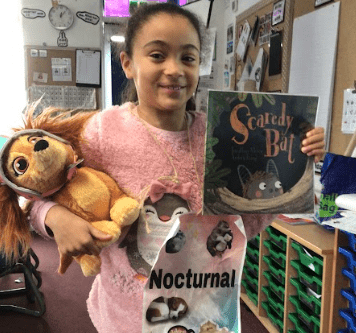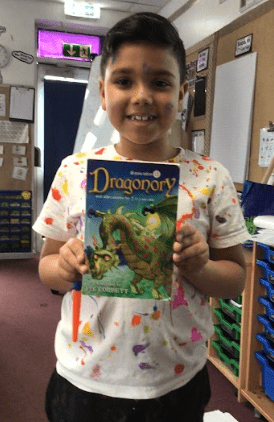Reading
Our Reading curriculum is based around our core values: Successful, Happy, Included, Nurtured and Enriched, and follows the National Curriculum guidance for Early Years, Key Stage 1 and Key Stage 2.
Through our Reading curriculum, pupils have a chance to develop culturally, emotionally, intellectually, socially and spiritually. It enables pupils to acquire knowledge and to build on what they already know.
The programmes of study for reading at key stages 1 and 2 consist of two dimensions: word reading and comprehension (both listening and reading). For word reading, we use Little Wandle phonics. For comprehension, we use VIPERS, which stands for Vocabulary, Inference, Prediction, Explanation, Retrieval, Sequence or Summarise. These domains ensure that students are familiar with a range of questions. Whole class reading sessions are timetabled across the school and children read a range of texts that reflect the diversity of our community and others around the world.
Alongside the class reading sessions, daily story time sessions take place to develop a love of reading. Here children have a chance to listen to the teacher read, share a book with a partner or read independently. We also hold whole school events, such as world book day, to promote reading for pleasure.
To become good readers, we aim for children to:
- read easily, fluently and with good understanding
- develop the habit of reading widely and often, for both pleasure and information
- acquire a wide vocabulary, an understanding of grammar and knowledge of linguistic conventions for reading, writing and spoken language
- appreciate our rich and varied literary heritage
- use discussion in order to learn; they should be able to elaborate and explain clearly their understanding and ideas
- are competent in the arts of speaking and listening, making formal presentations, demonstrating to others and participating in debate.
In Focus Provision children will have the opportunity to:
- Engage in activities to develop skills linked to personal targets.
- Use reading to support the children’s growing range of skills, providing them with opportunities to express themselves and produce pieces of work that are unique to them.
- Fully immerse themselves into all aspects of the curriculum in an engaging, motivating way which is purposeful to the learners.
- Engage in sensory based reading opportunities to enable them to develop awareness of their senses.
- Develop their communication skills through reading.
- Develop their skills using a variety of materials and tools.
In EYFS children will have the opportunity to:
- Say a sound for each letter in the alphabet and at least 10 digraphs
- Read words consistent with their phonic knowledge by sound-blending
- Read aloud simple sentences and books that are consistent with their phonic knowledge, including some common exception words.
- Comment on their interests and actions with staff echoing back what they say with new vocabulary added
- Listen to and engage actively in stories, non-fiction, rhymes and poems
- Through conversation, story-telling and role play, share their idea
- Become comfortable using a rich range of vocabulary and language structures.
In Key Stage 1 children will have the opportunity to:
- listen to, discuss and express view about a wide range of contemporary and classic poetry, stories and non-fiction at a level beyond that at which they can read independently
- discuss the sequence of events in books and how items of information are related
- become increasingly familiar with and retell a wider range of stories, fairy stories and traditional tales
- be introduced to non-fiction books that are structured in different ways
- recognise simple recurring literary language in stories and poetry
- discuss and clarify the meanings of words, linking new meanings to known vocabulary
- discuss their favourite words and phrases
- build up a repertoire of poems learnt by heart, appreciating these and reciting some, with appropriate intonation to make the meaning clear
- draw on what they already know or on background information and vocabulary
- check that the text makes sense to them as they read and correct inaccurate reading
- make inferences on the basis of what is being said and done
- answer and ask questions
- predict what might happen on the basis of what has been read so far
- participate in discussion about books, poems and other works that are read to them and those that they can read for themselves, taking turns and listening to what others say
- explain and discuss their understanding of books, poems and other material, both those that they listen to and those that they read for themselves.
In Key Stage 2 children will have the opportunity to:
- continue to read and discuss an increasingly wide range of fiction, poetry, plays, non-fiction and reference books or textbooks
- read books that are structured in different ways and read for a range of purposes
- increase their familiarity with a wide range of books, including myths, legends and traditional stories, modern fiction, fiction from our literary heritage, and books from other cultures and traditions
- recommend books that they have read to their peers, giving reasons for their choices
- identify and discuss themes and conventions in and across a wide range of writing
- make comparisons within and across books
- learn a wider range of poetry by heart, prepare poems and plays to read aloud and to perform
- check that the book makes sense to them, discuss their understanding and explore the meaning of words in context
- ask questions to improve their understanding
- draw inferences such as inferring characters’ feelings, thoughts and motives from their actions, and justifying inferences with evidence
- predict what might happen from details stated and implied
- summarise the main ideas drawn from more than one paragraph and identify key details that support the main ideas
- identify how language, structure and presentation contribute to meaning
- discuss and evaluate how authors use language, including figurative language, considering the impact on the reader
- distinguish between statements of fact and opinion
- retrieve, record and present information from non-fiction
- participate in discussions about books that are read to them and those they can read for themselves, building on their own and others’ ideas and challenging views
- explain and discuss their understanding of what they have read, including through formal presentations and debates, maintaining a focus on the topic and using notes where necessary
- provide reasoned justifications for their views.



